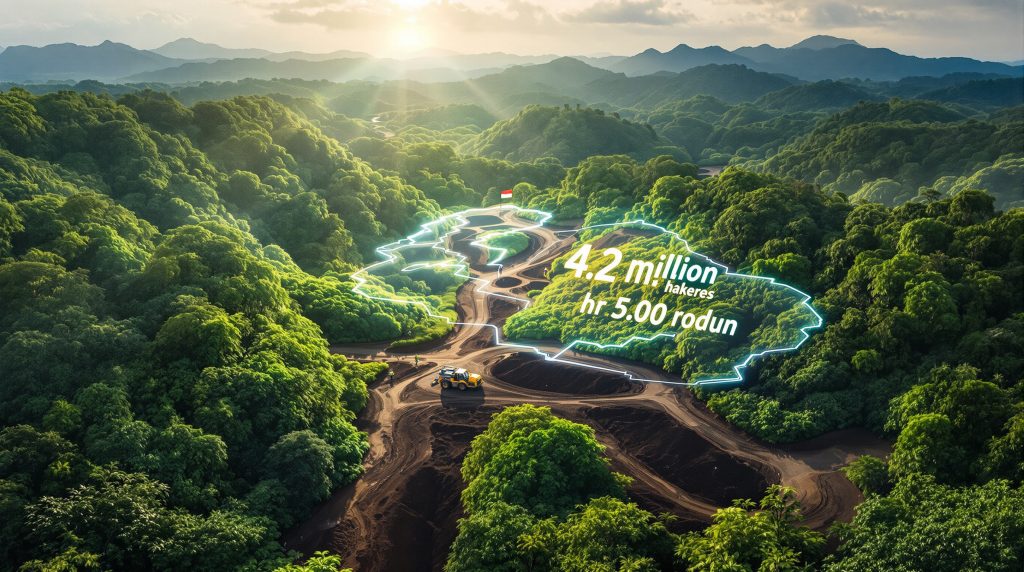Indonesian Mining Crackdown: Understanding the Forestry Permit Seizures
Indonesia's government has launched a significant enforcement action against mining companies operating without proper forestry permits, seizing hundreds of hectares of land and disrupting operations at major nickel production sites. This regulatory crackdown represents a pivotal shift in how Indonesia manages its natural resources and enforces compliance with forestry regulations.
The enforcement effort identified over 4.2 million hectares operated by 51 different mining companies lacking appropriate forestry approvals, highlighting the scale of non-compliance within the sector. Following this crackdown, nickel prices on the London Metal Exchange rose by 1.32% to $15,350 per tonne, reflecting market concerns about potential supply disruptions from the world's largest nickel producer.
Why Are Forestry Permits Critical for Indonesian Mining Operations?
Mining companies in Indonesia must navigate a complex regulatory landscape that requires both mining permits and forestry-specific authorizations. The "borrow-to-use" forestry permits (known locally as IPPKH) are mandatory for any mining activity conducted in designated forest areas, regardless of whether a company holds valid mining rights.
These permits serve multiple critical functions:
- Ensuring sustainable forest management practices
- Protecting biodiversity in resource-rich regions
- Maintaining environmental safeguards during extraction
- Providing legal clarity on land use rights
- Establishing clear boundaries for authorized mining activities
Without these forestry permits, companies operate in legal jeopardy regardless of their mining permitting basics, as demonstrated by the recent enforcement actions.
Which Major Mining Companies Have Been Affected by the Seizures?
PT Weda Bay Nickel's Case
The government taskforce seized 148 hectares from PT Weda Bay Nickel's concession area on Halmahera Island. Despite having proper mining permits, the company lacked the required forestry license for this specific section of their operations. According to Mining Ministry official Rilke Jeffri Huwae, "They have the mining permit, but they don't have the borrow-to-use permit for the forest."
The seized area was primarily used as a rock quarry for construction materials rather than for primary nickel extraction, which may limit the immediate impact on the company's nickel production capacity. However, the action signals the government's willingness to enforce regulations even on non-extraction areas within mining concessions.
PT Weda Bay Nickel operates one of Indonesia's largest nickel projects, spanning approximately 45,000 hectares. The joint venture is controlled by:
- Tsingshan Holding Group (Chinese partner)
- Eramet (French mining company)
- Aneka Tambang (Indonesian state-owned mining enterprise)
Eramet Indonesia has stated it is "committed to complying with regulations" and "respects the decisions of the Indonesian authorities." The company is working closely with authorities to ensure all activities meet required legal and regulatory standards.
PT Tonia Mitra Sejahtera's Situation
Authorities also seized 173 hectares from PT Tonia Mitra Sejahtera in South-East Sulawesi. This represents only a portion of the company's nearly 5,900-hectare mining permit area, but demonstrates the government's willingness to enforce regulations regardless of operation size.
According to Febrie Adriansyah, a senior prosecutor at the attorney general's office, the seizure was part of the broader enforcement effort targeting companies lacking proper forestry authorizations.
What is the Scale of Non-Compliance in Indonesia's Mining Sector?
The government taskforce has identified over 4.2 million hectares of land being operated by 51 different mining companies without proper forestry approvals. This massive scale of non-compliance suggests systemic issues in the sector's regulatory adherence and highlights why authorities have taken such decisive action.
This widespread non-compliance points to several potential issues within Indonesia's mining sector:
- Historical leniency in enforcement creating a culture of regulatory shortcuts
- Complexity in the mining claims framework leading to intentional or unintentional non-compliance
- Rapid expansion of mining activities outpacing regulatory oversight
- Possible coordination gaps between mining and forestry ministries
- Economic pressures incentivizing companies to begin operations before securing all permits
The government's recent enforcement action signals a shift toward stronger regulatory oversight and accountability in the mining sector.
How Has This Enforcement Action Affected Global Nickel Markets?
The enforcement actions have created market uncertainty, contributing to a 1.32% rise in benchmark nickel prices on the London Metal Exchange, reaching $15,350 per tonne. As Indonesia is the world's largest nickel producer, disruptions to its mining operations can have significant global supply implications.
The price increase, while moderate, reflects market concerns about:
- Potential supply disruptions if enforcement actions expand
- Uncertainty about which companies might be targeted next
- Possible delays in new project developments as companies ensure full regulatory compliance
- Increased operational costs associated with permitting requirements
- Market recalibration of Indonesian regulatory risk premiums
While Eramet has indicated that the seized area at Weda Bay does not include primary nickel extraction sites, limiting immediate production impacts, the precedent set by these enforcement actions has broader market implications.
What Environmental and Social Concerns Surround Indonesian Mining Operations?
Norway's Sovereign Wealth Fund Decision
Norway's sovereign wealth fund recently excluded Eramet from its investment portfolio, citing serious concerns about the Weda Bay nickel operations in Indonesia. The fund had previously held a 0.44% stake in Eramet valued at approximately $6.8 million.
The exclusion was based on multiple environmental and social concerns:
- Deforestation risks in ecologically sensitive areas
- Habitat destruction for endangered species
- Potential human rights violations affecting indigenous communities
- Inadequate environmental safeguards
- Insufficient stakeholder engagement with local populations
The Norwegian fund's decision highlights the growing importance of environmental, social, and governance (ESG) factors in investment decisions related to mining operations.
Broader Environmental Concerns
Indonesian mining operations, particularly in nickel-rich regions, face increasing scrutiny due to:
- Deforestation impacts in biodiversity hotspots
- Water pollution from mining waste
- Soil degradation and erosion
- Air quality issues from processing facilities
- Carbon emissions from energy-intensive extraction and processing
These environmental impacts often disproportionately affect local communities, creating social tensions and raising human rights concerns that compound the regulatory challenges facing mining companies.
How Does This Crackdown Reflect Indonesia's Changing Resource Management Strategy?
The enforcement action represents Indonesia's evolving approach to natural resource governance. The government appears to be balancing several priorities:
- Strengthening regulatory oversight: Ensuring mining companies comply with all relevant permits and environmental regulations
- Environmental protection: Preserving forest areas and preventing unauthorized exploitation
- Resource nationalism: Maintaining control over strategic resources while ensuring proper licensing
- Economic development: Supporting the mining sector's growth while enforcing compliance
This balanced approach reflects Indonesia's recognition that sustainable resource management requires both economic development and environmental protection, particularly as global markets increasingly demand responsibly sourced minerals.
What Legal Framework Supports These Enforcement Actions?
The government's actions are supported by Presidential Regulation Number 5 of 2025, which focuses specifically on regulating forest areas and emphasizes environmental protection. This regulation strengthens the legal basis for enforcement actions against companies operating without proper forestry permits.
The regulatory framework includes:
- Mining Law (Law No. 4 of 2009, as amended)
- Forestry Law (Law No. 41 of 1999, as amended)
- Environmental Protection and Management Law (Law No. 32 of 2009)
- Spatial Planning Law (Law No. 26 of 2007)
- Regional Government Law (Law No. 23 of 2014)
These interconnected regulations create a comprehensive legal framework governing mining activities in forest areas, providing clear authority for enforcement actions against non-compliant companies.
What Are the Implications for Mining Companies Operating in Indonesia?
Compliance Requirements
Mining companies must ensure they have:
- Valid mining permits (IUP/IUPK)
- Forestry "borrow-to-use" permits (IPPKH) for operations in forest areas
- Environmental impact assessments (AMDAL)
- Reclamation and post-mining plans
- Community development agreements
- Land acquisition and compensation documentation
- Proper tax and royalty payment structures
The complexity of these requirements highlights the importance of comprehensive regulatory compliance strategies for mining companies operating in Indonesia.
Operational Risks
Companies face significant operational risks from non-compliance, including:
- Land seizures and operational disruptions
- Financial penalties and increased compliance costs
- Reputational damage affecting stakeholder relationships
- Investor concerns about environmental and social governance
- Potential exclusion from ethical investment portfolios
- Legal liabilities and regulatory scrutiny
- Project delays and uncertainty
These risks underscore the importance of proactive compliance and stakeholder engagement strategies for mining companies in Indonesia.
How Are Mining Companies Responding to the Seizures?
PT Weda Bay Nickel has indicated it is seeking clarification from the government taskforce about the specific permit requirements and seizure details. Eramet Indonesia has publicly stated its commitment to regulatory compliance and is working with authorities to address the situation.
The company has noted that the seized area does not include their primary nickel extraction sites, potentially limiting the operational impact of this specific enforcement action. However, the seizure serves as a warning to ensure full compliance across all operational areas.
Industry-wide responses are likely to include:
- Comprehensive permit audits and compliance reviews
- Increased investment in regulatory affairs capabilities
- Enhanced stakeholder engagement strategies
- More robust environmental management systems
- Proactive remediation of any compliance gaps
These responses reflect the industry's recognition of the changing regulatory landscape and the importance of adapting to Indonesia's evolving resource governance approach.
What Does This Mean for Indonesia's Mining Future?
This enforcement action signals Indonesia's commitment to:
- Stricter regulatory enforcement: Companies can expect continued scrutiny of permit compliance
- Environmental protection: Greater emphasis on sustainable mining practices
- Balanced development: Pursuing economic growth while enforcing environmental and social safeguards
- Resource sovereignty: Maintaining control over strategic mineral resources through regulatory oversight
For Indonesia's mining sector, these priorities suggest a future characterized by:
- More rigorous compliance requirements
- Increased transparency in permitting processes
- Greater emphasis on sustainable and responsible mining practices
- Enhanced coordination between mining and forestry authorities
- Continued development of the downstream processing industry
These trends align with global industry evolution trends toward more sustainable and responsible resource extraction, positioning Indonesia's mining sector for long-term growth while addressing environmental and social concerns.
How Can Mining Companies Navigate Indonesia's Regulatory Environment?
Mining companies operating in Indonesia should:
- Conduct comprehensive permit audits: Ensure all required permits are in place for every operational area
- Engage proactively with authorities: Maintain open communication with regulatory bodies
- Invest in environmental compliance: Develop robust environmental management systems
- Respect community rights: Engage meaningfully with local and indigenous communities
- Prepare for regulatory changes: Monitor policy developments and adapt operations accordingly
- Develop strong local partnerships: Work with Indonesian partners who understand the regulatory landscape
- Maintain transparent operations: Document compliance efforts and be prepared for inspections
- Invest in sustainability initiatives: Demonstrate commitment to responsible mining practices
These strategies can help mining companies navigate Indonesia's complex regulatory environment while contributing to sustainable development goals.
Balancing Resource Development and Regulatory Compliance
Indonesia's seizure of mining lands lacking forestry permits demonstrates the government's commitment to enforcing regulations in the natural resource sector. As the world's largest nickel producer, Indonesia's regulatory actions have global implications for mineral supply chains and commodity markets.
The crackdown serves as a reminder that mining companies must navigate complex regulatory environments and maintain full compliance with all permit requirements. As Indonesia continues to develop its natural resources, the balance between economic development, environmental protection, and regulatory enforcement will remain a critical challenge for both the government and mining operators.
For companies investing in Indonesia's mining sector, this enforcement action highlights the importance of comprehensive due diligence, proactive compliance strategies, and meaningful stakeholder engagement. By embracing these principles, mining companies can contribute to Indonesia's sustainable development while mitigating operational and reputational risks.
The future of Indonesia's mining sector will likely be characterized by stricter regulatory oversight, greater emphasis on environmental protection, and continued development of downstream processing capabilities. Companies that adapt to this evolving landscape will be best positioned to participate in Indonesia's resource development while meeting growing global demand for responsibly sourced minerals and implementing effective mine reclamation insights to minimize their environmental footprint.
The recent Weda Bay nickel area seizure presents a valuable project halt case study for mining companies worldwide, illustrating the critical importance of maintaining comprehensive regulatory compliance in all operational aspects.
Want to Stay Ahead of Market-Moving Mining Discoveries?
Don't miss out on high-potential ASX mineral discoveries that could significantly impact your portfolio. Visit Discovery Alert's discoveries page to see how their proprietary Discovery IQ model delivers real-time alerts on significant mineral discoveries across Australia, giving subscribers a crucial market advantage.




